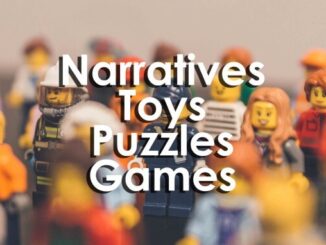
Ludogogy has entered into an agreement with Gamification Journal, based in Seoul, South Korea, for the mutual exchange of articles. This is the eighth of those articles we are publishing and it was in exchange for Keith Burnett and Zak Moore’s article about Play with a Purpose.
We suffer more from imagination than from reality.
These are the words of Lucius Annaeus Seneca (BC 4 ~ AD 65), a Roman empire politician. Human beings are fearful in unexpected situations and often ‘imagine the worst’. However, the imagination is also what stimulates human curiosity and makes life fun.
Many English words come from Latin or Greek language, but ‘Random’ comes from old Frankish and Germanic languages. The meaning of ‘rant’ in French, and ‘randa’ in old German is running fast. Because of running fast, people are subject to pick up hurriedly.
The feature picture of this article represents the randomness of ‘selecting’ water bottles which marathon runners do when running fast past a water station.
Similar concepts can be found in Korean food delivery applications. If people want to order a delivery but get the food as soon as possible without taking the time to specifically choose, they can take the option of the ‘Random menu’. For people who are busy ‘running fast’, the time to consider can be reduced and selections can be quickly made.
Selections by randomness and their results are found in many situations around us. For example, the Lottery gives joy through imagination (of what would happen if one won), and that pleasure is based in randomness. When people play the lottery, they can spend a happy week imagining of ‘If I win, what will I do?’.
In many countries there are traditions about ‘lucky numbers’ which have been passed down through the generations. When people buy tickets they often use this number in at least one game. But in Korea, ‘Fast-running’ is preferred (in the UK it is the ‘Lucky Dip option) and omits the processes of choosing numbers. This is the most suitable if we are considering the use of randomness.

’Random box’ – on the verge of fun and addiction
So, randomness can be fun in daily life, but there is also a dark side. Some businesses including ‘Random box’ or ‘Lucky box’ take advantage of this human tendency to enjoy randomness. The ‘Random box’ bought by users and includes various products. The company advertises that there is a chance of obtaining luxurious products in the purchased box. This arouses the users’ expectations. However, in reality, in most cases, users will find low quality and low cost products when they open their box.
This kind of ‘Random box’ is also found in online games, where it is also known as a Loot Box. These have become socially problematic, in Korea, particularly when they relate to ‘game draw’ and ‘game enhancement’ contents and they are currently being discussed as a possible regulatory area.
Most European countries regulate ‘Random boxes’ to prevent them being sold to underage users. In the 2018, the Netherlands and Belgium decided that ‘Random boxes’ violate lottery law. In Europe, not only Random Boxes but also giveaways, such as the stickers in Pokémon bread, which are popular in Korea, can be seen in a negative way. It is viewed differently in Korea where collecting Pokemon stickers is seen in terms of reminiscence and play.
From this perspective, randomness seems to have more negative side effects than positive ones. However, the fact that there are discussions about regulatory issues shows how attractive randomness can be to users. So how can we keep the attraction of randomness while getting rid of some of the more negative exploitative side effects?

(Source: SPC Samlip Youtube)
Controllable randomness
Randomness becomes truly valuable when it is controlled, which looks like a contradiction, on the face of it. Let’s think about the process how to make games. The enagaging nature of randomness was often used used to extract more money from users.
The ‘Random box’ in games covers all items which can be earned by gameplay. the number of items which are allocated to each gamer is calculated. If there are many items given to gamers, the boxes often consist of various types and grades.
A high-grade ‘Legendary box’ contains good items but is sold at a high price. Other ‘General boxes’ include items that are got easily in games. The ‘General box’ can be easily obtained just by playing specific content without any payment. Another type of box is the ‘Event’. This is attached to another box which already contains other items. When opening a random box during the period of an ‘event’, players have a (usually low) probability of obtaining new or time-bound items. To stimulate activity, the time-bound nature of these potential rewards are publicised to players.
Randomness as a game mechanism makes gamers seek new fun and value by utilizing original components. Randomness is controlled by types, as above. In fact, this method is taken for granted in almost all games. But, this process leads to the distrust of gamers and a crisis in Korean games.

The future of randomness is to delete ‘negative experiences’
The notable point is that the type of gamification by randomness can be changed in a positive way. In the future, randomness should move in the direction of mitigating the ‘distrust’ of users and maximizing the positive experience. For this, the loss by randomness should be minimized, distrust can change to trust if only additional benefit rather than loss comprises the random experience. The way to get better things must be shown, in proportion to time and effort spent by users to get the reward. The stress and feeling of deprivation by randomness are all removed, and only happiness, flutter, and pleasure remain.
For example, imagine that you receive your salary as a ‘random box’. If random boxes work as described above, many employees would be fearful that the contents of the box might well be lower than the original salary received. However, there is a way to make everyone happy even if the salary is paid randomly. The randomness only relates to the probability of receiving unconditionally more than the existing salary. It is a ‘salary plus random box’ that completely deletes negative ‘minus’ and leaves only ‘plus’.
There might be a problem for the company to maintain this for everyone, but that is not what is suggested. This can be improved by setting an affordable total amount and setting the conditions to open the box. Basically, only employees who want ‘Random box’ can open the box. If they don’t want to, they can still get the original salary. Instead, employees who want ‘Random box’ must meet the conditions such as participating in ideation for company development or achievement of specified performance or objectives. This gamification thus becomes part of a system of feedback and ideas.
If you are an employee who wants to receive your salary in a ‘random box’, you should honestly report what you think about your work and company, and work together to achieve the team’s goals. Only employees who have gone through this process can open the ‘Salary Plus Random Box’. Employees who have had a positive experience through this process will definitely want a ‘salary plus random box’ next time. Of course, the amount of increase may be different from what you expect.
In the future, the method using random elements in a more positive way will have to go through more trial and error. Through this process, it must evolve and develop enough to be able to utilize random as a mechanism. Based on deeper and more sophisticated research, it should reach a level that can be used in gamification. The positive element of random can then be fully utilized in various industries such as education and training, marketing, and service. For now, we need to open up the future of random by thinking about how to use random and what kind of effort is needed in the future.
- The Future of Randomness - 1st August 2022





Be the first to comment